大学英语教材2第二单元
全新版大学英语第二版第二册Unit2课文译文及参考答案
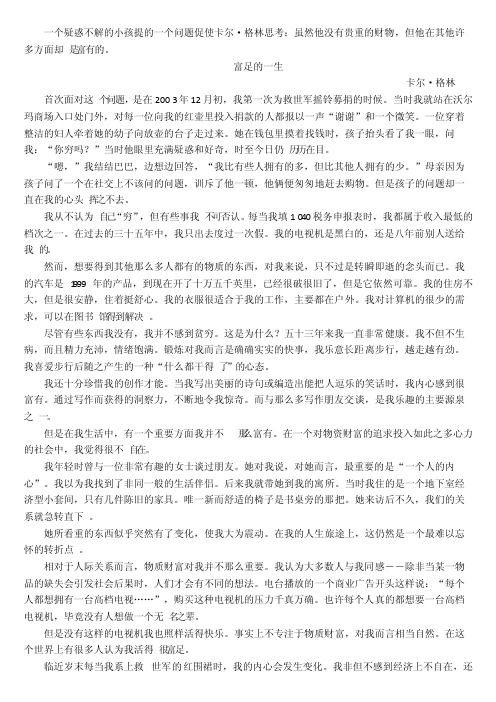
一个疑惑不解的小孩提的一个问题促使卡尔·格林思考:虽然他没有贵重的财物,但他在其他许多方面却是富有的。
富足的一生卡尔·格林首次面对这个问题,是在2003年12月初,我第一次为救世军摇铃募捐的时候。
当时我就站在沃尔玛商场入口处门外,对每一位向我的红壶里投入捐款的人都报以一声“谢谢”和一个微笑。
一位穿着整洁的妇人牵着她的幼子向放壶的台子走过来。
她在钱包里摸着找钱时,孩子抬头看了我一眼,问我:“你穷吗?”当时他眼里充满疑惑和好奇,时至今日仍历历在目。
“嗯,”我结结巴巴,边想边回答,“我比有些人拥有的多,但比其他人拥有的少。
”母亲因为孩子问了一个在社交上不该问的问题,训斥了他一顿,他俩便匆匆地赶去购物。
但是孩子的问题却一直在我的心头挥之不去。
我从不认为自己“穷”,但有些事我不可否认。
每当我填1040税务申报表时,我都属于收入最低的档次之一。
在过去的三十五年中,我只出去度过一次假。
我的电视机是黑白的,还是八年前别人送给我的。
然而,想要得到其他那么多人都有的物质的东西,对我来说,只不过是转瞬即逝的念头而已。
我的汽车是1999年的产品,到现在开了十万五千英里,已经很破很旧了,但是它依然可靠。
我的住房不大,但是很安静,住着挺舒心。
我的衣服很适合于我的工作,主要都在户外。
我对计算机的很少的需求,可以在图书馆得到解决。
尽管有些东西我没有,我并不感到贫穷。
这是为什么?五十三年来我一直非常健康。
我不但不生病,而且精力充沛,情绪饱满。
锻炼对我而言是确确实实的快事,我乐意长距离步行,越走越有劲。
我喜爱步行后随之产生的一种“什么都干得了”的心态。
我还十分珍惜我的创作才能。
当我写出美丽的诗句或编造出能把人逗乐的笑话时,我内心感到很富有。
(完整版)全新版大学英语2第二单元ALifeFullofRiches

A Life Full of Riches富足的一生It was early December 2003, my first season as a Salvation Army bell ringer, when I was confronted with the question. I was standing just outside the doorway of a Wal-Mart, offering a "thank you" and a smile to each person who dropped a donation into my red kettle. A neatly dressed woman and her young son walked up to the kettle stand. While she searched her purse for some cash, the boy looked up at me. I can still see the confusion and curiosity in his eyes as he asked, "Are you poor?"首次面对这个问题,是在2003年12月初,我第一次为救世军摇铃募捐的时候。
当时我就站在沃尔玛商场入口处门外,对每一位向我的红壶里投入捐款的人都报以一声“谢谢”和一个微笑。
一位穿着整洁的妇人牵着她的幼子向放壶的台子走过来。
她在钱包里摸着找钱时,孩子抬头看了我一眼,问我:“你穷吗?”当时他眼里充满疑惑和好奇,时至今日仍历历在目。
"Well," I stammered, trying to think, "I have more than some people, but not as much as others." His mother scolded him for the social no-no, and they hurried off to do their shopping. His question, however, did not leave me.“嗯,”我结结巴巴,边想边回答,“我比有些人拥有的多,但比其他人拥有的少。
全新版大学英语第二版综合教程2第二单元课文翻译
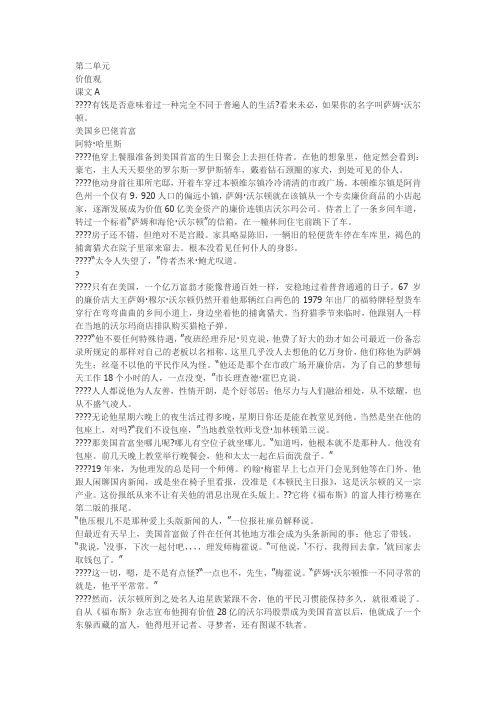
第二单元价值观课文A有钱是否意味着过一种完全不同于普遍人的生活?看来未必,如果你的名字叫萨姆·沃尔顿。
美国乡巴佬首富阿特·哈里斯他穿上餐服准备到美国首富的生日聚会上去担任侍者。
在他的想象里,他定然会看到:豪宅,主人天天要坐的罗尔斯一罗伊斯轿车,戴着钻石颈圈的家犬,到处可见的仆人。
他动身前往那所宅邸,开着车穿过本顿维尔镇冷冷清清的市政广场。
本顿维尔镇是阿肯色州一个仅有9,920人口的偏远小镇,萨姆·沃尔顿就在该镇从一个专卖廉价商品的小店起家,逐渐发展成为价值60亿美金资产的廉价连锁店沃尔玛公司。
侍者上了一条乡间车道,转过一个标着“萨姆和海伦·沃尔顿”的信箱,在一幢林间住宅前跳下了车。
房子还不错,但绝对不是宫殿。
家具略显陈旧,一辆旧的轻便货车停在车库里,褐色的捕禽猎犬在院子里窜来窜去。
根本没看见任何仆人的身影。
“太令人失望了,”侍者杰米·鲍尤叹道。
只有在美国,一个亿万富翁才能像普通百姓一样,安稳地过着普普通通的日子。
67岁的廉价店大王萨姆·穆尔·沃尔顿仍然开着他那辆红白两色的1979年出厂的福特牌轻型货车穿行在弯弯曲曲的乡间小道上,身边坐着他的捕禽猎犬。
当狩猎季节来临时,他跟别人一样在当地的沃尔玛商店排队购买猎枪子弹。
“他不要任何特殊待遇,”夜班经理乔尼·贝克说,他费了好大的劲才如公司最近一份备忘录所规定的那样对自己的老板以名相称。
这里几乎没人去想他的亿万身价,他们称他为萨姆先生;丝毫不以他的平民作风为怪。
“他还是那个在市政广场开廉价店,为了自己的梦想每天工作18个小时的人,一点没变,”市长理查德·霍巴克说。
人人都说他为人友善,性情开朗,是个好邻居;他尽力与人们融洽相处,从不炫耀,也从不盛气凌人。
无论他星期六晚上的夜生活过得多晚,星期日你还是能在教堂见到他。
当然是坐在他的包座上,对吗?“我们不设包座,”当地教堂牧师戈登·加林顿第三说。
新版大学英语教材目录

新版大学英语教材目录第一单元:个人发展与学习1.1 课程简介1.2 学习环境与资源1.3 学习方法与技巧1.4 思维导图与概念框架1.5 信息获取与整理第二单元:语言与交际2.1 语言的组成与功用2.2 语言形式与用途2.3 语法知识与应用2.4 口语表达与听力训练2.5 书面表达与阅读理解第三单元:社交与人际关系3.1 社交场合中的礼仪与规范3.2 团队合作与沟通技巧3.3 人际关系管理与冲突解决3.4 职业素养与个人品质3.5 社会责任与公众参与第四单元:文化与全球视野4.1 文化差异与跨文化沟通4.2 国际交流与多元文化融合4.3 文化产业与艺术欣赏4.4 科技与社会发展4.5 环境保护与可持续发展第五单元:职业与职场5.1 职业规划与发展5.2 就业面试与求职技巧5.3 职场沟通与人际关系5.4 领导力与团队管理5.5 职业道德与职业素养第六单元:大学生活与社团活动6.1 大学生活的特点与规划6.2 学生社团与组织6.3 学术研究与科技创新6.4 志愿者服务与社会实践6.5 健康与心理调适第七单元:综合实践与实习7.1 实习申请与安排7.2 实践活动的准备与执行7.3 实习过程中的问题与应对7.4 实践经验总结与反思7.5 实践成果展示与分享第八单元:跨学科知识与终身学习8.1 跨学科思维与创新能力8.2 跨领域知识与学科融合8.3 终身学习与自我发展8.4 学科辅助工具与资源8.5 学习成果展示与评价第九单元:英语能力及测试9.1 英语听力理解与口语表达9.2 英语阅读理解与写作能力9.3 英语词汇与语法知识9.4 英语听力与口语测试技巧9.5 英语阅读与写作测试技巧第十单元:学术研究与论文写作10.1 学术研究的基本方法与过程10.2 学术论文的结构与写作技巧10.3 学术查找与文献综述10.4 学术规范与文责10.5 学术研究成果展示与交流以上是新版大学英语教材的目录,在这些单元中涵盖了个人发展与学习、语言与交际、社交与人际关系、文化与全球视野、职业与职场、大学生活与社团活动、综合实践与实习、跨学科知识与终身学习、英语能力及测试、学术研究与论文写作等方面的内容。
大学英语教材unit2
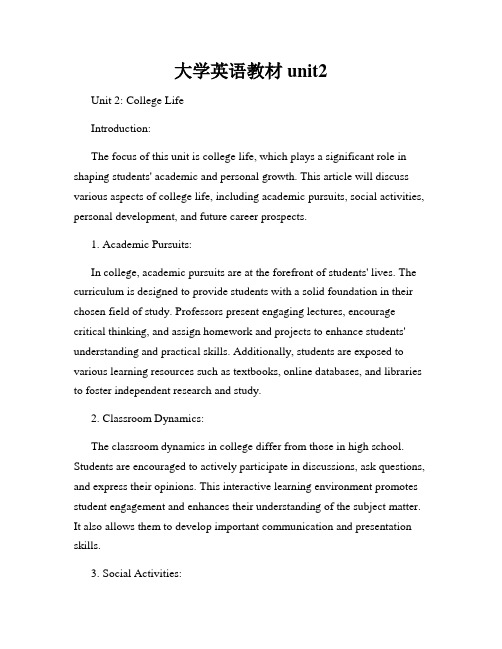
大学英语教材unit2Unit 2: College LifeIntroduction:The focus of this unit is college life, which plays a significant role in shaping students' academic and personal growth. This article will discuss various aspects of college life, including academic pursuits, social activities, personal development, and future career prospects.1. Academic Pursuits:In college, academic pursuits are at the forefront of students' lives. The curriculum is designed to provide students with a solid foundation in their chosen field of study. Professors present engaging lectures, encourage critical thinking, and assign homework and projects to enhance students' understanding and practical skills. Additionally, students are exposed to various learning resources such as textbooks, online databases, and libraries to foster independent research and study.2. Classroom Dynamics:The classroom dynamics in college differ from those in high school. Students are encouraged to actively participate in discussions, ask questions, and express their opinions. This interactive learning environment promotes student engagement and enhances their understanding of the subject matter. It also allows them to develop important communication and presentation skills.3. Social Activities:Apart from their academic commitments, college students engage in various social activities. These activities create opportunities for students to form friendships, develop social networks, and experience personal growth. Student clubs, cultural events, sports teams, and volunteer activities are popular choices for students to actively participate in their college community.4. Personal Development:College life offers a platform for personal growth and self-discovery. Students gain valuable life skills such as time management, organization, and responsibility as they juggle academics, extracurricular activities, and personal commitments. Living away from home and being independent also fosters self-reliance and decision-making abilities.5. Future Career Prospects:One of the primary goals of college education is to prepare students for their future careers. In addition to academic knowledge, college life offers various opportunities for students to develop professional skills. Internships, career fairs, and networking events provide avenues for students to gain practical experience and establish professional connections. Colleges also offer career counseling and guidance to help students explore different career paths and make informed decisions.Conclusion:College life is a transformative period that shapes students academically, socially, and personally. Through academic pursuits, engagement in social activities, personal growth, and future career prospects, students acquire thenecessary skills and experiences to succeed in their chosen fields. The holistic development offered by college life not only prepares students for their professional lives but also helps them become well-rounded individuals.。
大学英语教材第二单元
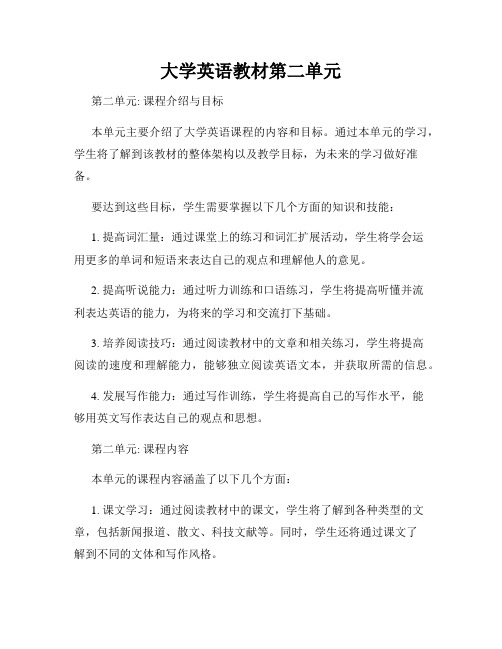
大学英语教材第二单元第二单元: 课程介绍与目标本单元主要介绍了大学英语课程的内容和目标。
通过本单元的学习,学生将了解到该教材的整体架构以及教学目标,为未来的学习做好准备。
要达到这些目标,学生需要掌握以下几个方面的知识和技能:1. 提高词汇量:通过课堂上的练习和词汇扩展活动,学生将学会运用更多的单词和短语来表达自己的观点和理解他人的意见。
2. 提高听说能力:通过听力训练和口语练习,学生将提高听懂并流利表达英语的能力,为将来的学习和交流打下基础。
3. 培养阅读技巧:通过阅读教材中的文章和相关练习,学生将提高阅读的速度和理解能力,能够独立阅读英语文本,并获取所需的信息。
4. 发展写作能力:通过写作训练,学生将提高自己的写作水平,能够用英文写作表达自己的观点和思想。
第二单元: 课程内容本单元的课程内容涵盖了以下几个方面:1. 课文学习:通过阅读教材中的课文,学生将了解到各种类型的文章,包括新闻报道、散文、科技文献等。
同时,学生还将通过课文了解到不同的文体和写作风格。
2. 语法练习:本单元的语法练习主要包括时态、语态、冠词等基础语法知识的学习和应用。
通过练习,学生可以更好地理解和运用这些语法知识。
3. 阅读理解:通过阅读教材中的文章并完成相关问题,学生将提高他们的阅读理解能力。
他们将学会通过阅读获取信息,并将这些信息应用到实际中去。
4. 听力练习:通过听取教材中的录音和相关练习,学生将提高他们的听力技巧。
他们将学会辨别不同的语音、听懂英语对话和演讲,并能够做出正确的回答。
第二单元: 学习方法与技巧为了帮助学生更好地学习和掌握英语,以下是一些学习方法和技巧的建议:1. 定期复习:英语学习需要不断的巩固和复习。
定期复习所学的内容,可以帮助学生更好地记忆和理解。
2. 多听多说:多听英语录音和多进行口语练习,可以提高听说能力。
可以通过听英语歌曲、看英语电影等方式来扩展听力素材。
3. 多阅读:多进行英语阅读,可以提高阅读理解能力。
大学英语二第二单元作文
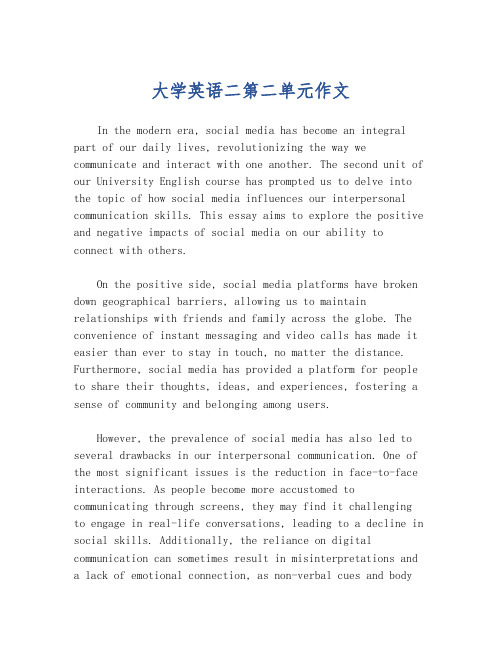
大学英语二第二单元作文In the modern era, social media has become an integral part of our daily lives, revolutionizing the way we communicate and interact with one another. The second unit of our University English course has prompted us to delve into the topic of how social media influences our interpersonal communication skills. This essay aims to explore the positive and negative impacts of social media on our ability to connect with others.On the positive side, social media platforms have broken down geographical barriers, allowing us to maintain relationships with friends and family across the globe. The convenience of instant messaging and video calls has made it easier than ever to stay in touch, no matter the distance. Furthermore, social media has provided a platform for people to share their thoughts, ideas, and experiences, fostering a sense of community and belonging among users.However, the prevalence of social media has also led to several drawbacks in our interpersonal communication. One of the most significant issues is the reduction in face-to-face interactions. As people become more accustomed to communicating through screens, they may find it challenging to engage in real-life conversations, leading to a decline in social skills. Additionally, the reliance on digital communication can sometimes result in misinterpretations and a lack of emotional connection, as non-verbal cues and bodylanguage are often lost in translation.Another concern is the impact of social media on self-esteem and mental health. The curated nature of social media can create unrealistic expectations and a fear of missing out (FOMO), leading to feelings of inadequacy and anxiety among users. Moreover, the pressure to present a perfect life online can lead to authenticity being sacrificed for the sake of social approval.In conclusion, while social media has undoubtedly enhanced our ability to connect with others in some ways, it has also introduced challenges to our interpersonal communication. It is crucial for individuals to find a balance between online and offline interactions, ensuringthat they maintain genuine connections and do not lose the ability to communicate effectively in person. As we continue to navigate the digital landscape, it is essential to be mindful of the role social media plays in our lives and to cultivate skills that promote healthy and meaningful relationships.。
大学英语二(综合教程)第二单元

⼤学英语⼆(综合教程)第⼆单元⼤学体验英语⼆(综合教程)Unit 2Jobs and CareersListen and TalkLead inWhat kind of job are you looking for? The classified ads are a good place to begin a 1.____for employment. They are a great resource to learn about what companies look for in employees and 2.____a little information about the company as well. Applying and interviewing for a job requires skills worth developing. Being able to 3.____one’s strengths, effectively communicating with 4.____, having a desire to learn more about the 5.____, and displaying enthusiasm can sometimes make up for inexperience. As you look at the pictures, think about the different 6.____each profession or vocation requires. A construction worker, a waiter and a farmer may not need higher education for their pursuits, but it 7.____helps. Secretarial work requires less education than being a teacher or a doctor, but each job is important in society.While becoming a teacher requires a 8.____of four years study at a university, teaching entails constant learning. Understanding deeply the subject matter being taught and discovering the 9.____of students are just two areas of 10.____for teachers. Many studies continue to research how to effectively teach and how to teach students to effectively learn. In one way or another, we are all teachers.Key: 1. Search; 2. offer; 3. identify; 4. confidence; 5. employer;6. qualifications7. certainly;8. minimum;9. learning styles; 10. importance ; Passage A: Your Dream Job: A Click Away2.Answer the following questions with the information from the passage.1. What is JOB-TRAK?It is an Internet website that lists as many as 45 000 job opportunities.2.Does one need to have a lot of knowledge about the Internet before using it?Not necessarily so. According to Smith, the Internet was very easy to use. She found her job online with no training.3. Why did Gragg apply to teach English in Japan?Because she wanted a change in her life.4.What preparations did Mello make before she went for her interview?She searched the Internet for information about the financial performance of the company she was interested in, the salary she should ask for, and the possible living accommodations available to her there.5. Compare job-seeking on the Internet and job-seeking on newspapers or at job markets. What are the strengths and limitations of each?Answer: Open.3. Choose the best answer to each question based on the information you obtain from the passage.1. Which of the following best summarizes the main idea of the passage?A) The Internet can help one find an overseas job.B) The Internet can give one information about all companies.C) One can find a better job with the help of the Internet.D) There are many employment websites one can turn to for help.2. "To click one's way into a job" means __________.A) to find a job by searching the InternetB) to get a job by clicking a mouseC) to access the job websiteD) to know the way to do one's job3. It can be inferred that __________ .A) originally only job vacancies in high-tech fields were listed on the InternetB) most newspapers and publications don't have a section of classified listingsC) many companies are using the Internet as their management assistantsD) many people can get a job offer now without going through an interview4. Dozlic found a better job __________.A) while browsing a website for baseball tradesB) by casually checking out an online classified adC) because of his curiosity about the InternetD) because of the experience he obtained from other jobs5. Mello searched the Internet for all the following information except __________.A) job vacanciesB) a company's financial performanceC) the minimum salaryD) rental propertiesAnswer: 1.C, 2.A, 3.A, 4.A, 5.C4. Fill in the blanks with the words given below. Change the form where necessary.1. I'm absolutely sure that this dress is a cheaper ____ of the one we saw in that department store.2. The bookshelves were crowded with books and scientific ____ .3. If you want to open a file, ____ twice on the icon(图标)for it.4. To their disappointment, the thieves were ____ by the police at the moment they were enteringthe bank.5. During World War II, many ____ fled to the United States.6. They've updated(更新) a lot of _____ in the most recent edition of the dictionary.7. Despite _____ difficulties,they did not find the life in London unpleasant.8. After a lot of part-time jobs, John finally got a ____ position.9. In your report, you should give a _____ description of the whole incident.10. Companies publish ____ reports to inform the public about the previous year's activities Anwser: 1.version, 2.publications, 3.click, 4.spotted, 5.refugees,6.entries,7.financial,8.full-time,9.detailed, 10.annual5. Complete the following sentences with phrases or expressions from the passage.Change the form where necessary.1. At the age of 29, he ____ a commercial property business.2. While she was tidying up the living room, she ____ her old photograph album.3. My doctor ____ me ____ a specialist in heart disease.4. He hired private investigators to ____ his future business partner.5. She only _____ her son's marriage long after the event.Answer: 1.set up, 2.came across, 3.referred...to , 4.check out, 5.learnt of / learned of6. Choose an appropriate noun given in the following box to complete each of the sentences.1. She is now concentrating on a/an ___ as a fashion designer.2.When I went for my first ___ for this job I arrived extremely early.3.Police insisted that Michael did not follow the correct ____ in applying for a visa.4.We organized a/an ____ of recent book upon constant requests from the readers.5.The newspaper publishes a/an ____ of a leading sportsman every week.Answer: 1.career 2.interview 3.procedure 4.exhibit 5.profile7.Translate the following sentences into English.1. 警察们正忙着填写关于这场事故的各种表格。
- 1、下载文档前请自行甄别文档内容的完整性,平台不提供额外的编辑、内容补充、找答案等附加服务。
- 2、"仅部分预览"的文档,不可在线预览部分如存在完整性等问题,可反馈申请退款(可完整预览的文档不适用该条件!)。
- 3、如文档侵犯您的权益,请联系客服反馈,我们会尽快为您处理(人工客服工作时间:9:00-18:30)。
大学英语教材2第二单元
Unit 2: Talking about Daily Routines
I. Introduction
In the second unit of the college English textbook 2, we will focus on talking about daily routines. This unit will help students expand their vocabulary related to daily activities, as well as develop their speaking and writing skills. By the end of this unit, students will be able to communicate proficiently about their daily routines and describe their typical day.
II. Vocabulary
To effectively communicate about daily routines, it is essential to have a strong vocabulary base. Here are some key vocabulary words related to daily activities:
1. Wake up
2. Brush teeth
3. Take a shower
4. Get dressed
5. Have breakfast
6. Attend classes
7. Study
8. Go to the library
9. Have lunch
10. Relax
11. Exercise
12. Cook dinner
13. Watch TV
14. Read
15. Go to bed
III. Grammar
In this unit, we will also learn about the use of simple present tense to talk about habitual actions. The simple present tense is commonly used to describe routines, habits, and general truths. For example:
1. I wake up at 6 am every day.
2. She brushes her teeth twice a day.
3. They attend classes from Monday to Friday.
IV. Speaking Practice
To enhance speaking skills, we will engage in various speaking activities, such as role plays and group discussions. Students will have the opportunity to practice asking and answering questions about daily routines. They will also learn to express their preferences and opinions regarding different activities.
V. Writing Practice
In the writing component of this unit, students will be asked to write a descriptive paragraph about their typical day. They will incorporate the vocabulary and grammar structures learned throughout the unit to create a well-organized and coherent piece of writing. Students will be encouraged to pay attention to proper sentence structure and to use appropriate transition words to connect their ideas.
VI. Listening and Reading Comprehension
To improve their listening and reading skills, students will listen to audio recordings and read texts related to daily routines. They will develop their ability to understand spoken and written English in different contexts, while also familiarizing themselves with the vocabulary and grammatical structures used in the unit.
VII. Cultural Awareness
In addition to language skills, this unit also aims to broaden students' cultural awareness. They will learn about daily routines in different countries and appreciate the diversity of lifestyles around the world. This cross-cultural understanding will enhance their global perspective and empathy towards others.
VIII. Conclusion
The second unit of the college English textbook 2 provides students with the necessary tools and knowledge to discuss daily routines confidently. Through vocabulary expansion, grammar practice, speaking and writing activities, and exposure to various cultural aspects, students will further develop their English communication skills. By the end of this unit, students
will have a solid foundation in talking about daily routines and will be better equipped to engage in conversations about their own lives and experiences.
Note: This article is a sample and may not align exactly with the content of Unit 2 in the actual college English textbook 2. It is important to refer to the specific textbook for accurate information.。
